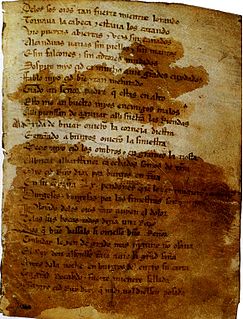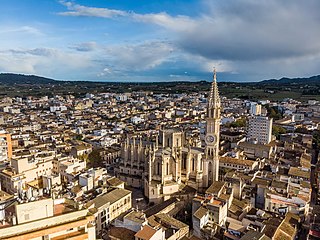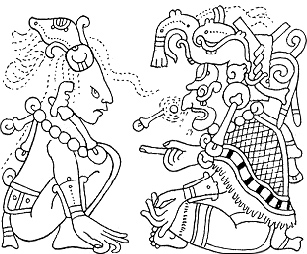
Rodrigo Díaz de Vivar was a Castilian knight and warlord in medieval Spain. Fighting with both Christian and Muslim armies during his lifetime, he earned the Arabic honorific al-sīd, which would evolve into El Cid, and the Spanish moniker El Campeador. He was born in Vivar del Cid, a village near the city of Burgos. As the head of his loyal knights, he came to dominate the Levante of the Iberian Peninsula at the end of the 11th century. He reclaimed the Taifa of Valencia from Moorish control for a brief period during the Reconquista, ruling the principality as its Prince from 17 June 1094 until his death in 1099. His wife, Jimena Díaz, inherited the city and maintained it until 1102 when it was reconquered by the Moors.

Simancas is a town and municipality of central Spain, located in the province of Valladolid, part of the autonomous community of Castile and León. It is situated approximately 10 km southwest of the provincial capital Valladolid, on the road to Zamora and the right bank of the river Pisuerga.
Chilean music refers to all kinds of music developed in Chile, or by Chileans in other countries, from the arrival of the Spanish conquistadors to the modern day. It also includes the native pre-Columbian music from what is today Chilean territory.

El Cantar de mio Cid, literally "The Song of my Cid", or "The Song of my lord", also known in English as The Poem of the Cid, is the oldest preserved Castilian epic poem. Based on a true story, it tells of the deeds of the Castilian hero Rodrigo Díaz de Vivar known as El Cid and takes place during the eleventh century, an era of conflicts in the Iberian Peninsula between the Kingdom of Castile and various Taifa principalities of Al-Andalus. It is considered a national epic of Spain.

Manacor is a town and municipality on the island of Mallorca, part of the Spanish autonomous community of the Balearic Islands. The municipality has tourist areas such as Porto Cristo, site of the famous Caves of Drach, and Cales de Mallorca. Manacor has one of the busiest street markets on the island, held every Monday morning. Manacor is famous for furniture manufacture and artificial pearls.
El amor brujo is a ballet by Manuel de Falla to a libretto by María de la O Lejárraga García, although for years it was attributed to her husband Gregorio Martínez Sierra. It exists in three versions as well as a piano suite drawn from four of its movements. Andalusian in character, its music includes the celebrated Danza ritual del fuego , the Canción del fuego fatuo and the Danza del terror. Its songs use the Andalusian Spanish dialectal modality. The plot: a gypsy in a love unreturned goes to her arts of magic to soften the ingrate's heart, and succeeds, after a night of enchantments, recitations and ritual dances, so that at dawn he awakens to love; bells proclaim her triumph.

Vivar, or Vivar del Cid, is a village of approximately 260 inhabitants, part of the municipality of Quintanilla Vivar, located 7 kilometers (4.3 mi) away from Burgos, Spain.

Quart de Poblet is a municipality in the comarca of Horta Oest in the Valencian Community, Spain. It has 25,499 inhabitants.
Axé Bahia is a six-member Eurodance/axé music group from Brazil, who achieved fame in South America with their single "Beijo na Boca", particularly the Spanish-language version, "Beso en la Boca".

M.O.T.A. is the fourth studio album by the Puerto Rican reggae band, Cultura Profética. The album was recorded at Playbach Studios in San Juan, Puerto Rico, and released in 2005.

Cetina is a municipality in the province of Zaragoza, Aragon. It is situated at an altitude of 666 metres (2,185 ft) in the south east of the province, in the Comunidad de Calatayud, some 176 kilometres (109 mi) north east of Madrid and 98 kilometres (61 mi) south west of Zaragoza. The population in 2011 was 687.

Los Rodríguez were a rock band composed of two Argentines, two Spaniards and one Puerto Rican that played during the 1990s.

Rillo de Gallo is a municipality located in the province of Guadalajara, Castile-La Mancha, Spain. According to the 2004 census (INE), the municipality has a population of 74 inhabitants.

The Maya death gods, known by a variety of names, are two basic types of death gods who are respectively represented by the 16th-century Yucatec deities Hunhau and Uacmitun Ahau mentioned by Spanish Bishop Landa. Hunhau is the lord of the Underworld. Iconographically, Hunhau and Uacmitun Ahau correspond to the Gods A and A' . In recent narratives, particularly in the oral tradition of the Lacandon people, there is only one death god, who acts as the antipode of the Upper God in the creation of the world and of the human body and soul. This death god inhabits an Underworld that is also the world of the dead. As a ruler over the world of the dead, the principal death god corresponds to the Aztec deity Mictlantecuhtli. The Popol Vuh has two leading death gods, but these two are really one: Both are called "Death," but while one is known as "One Death," the other is called "Seven Death." They were vanquished by the Hero Twins.

Paco de Lucía interpreta a Manuel de Falla is the twelfth studio album by the Spanish composer and guitarist Paco de Lucía. All the pieces were written by Manuel de Falla.
Grupo Yndio is a Mexican band from Sonora founded in 1972, by some of the members of the dissolute Los Pulpos.

The Cojines del Zaque is an archeological site of the Muisca located in the city of Tunja, Boyacá, which in the time of the Muisca Confederation was called Hunza. The cojines are two round stones used in the religion of the Muisca to worship Sun god Sué and his wife; Moon goddess Chía. When the Spanish conquistadores arrived, they called them Cojines del Diablo.

The Way of El Cid is a cultural and tourist route that crosses Spain from the northwest to the southeast, from Castilla to the Mediterranean coast. It follows the history and the legend of Rodrigo Díaz de Vivar, El Cid Campeador, a medieval knight of the 11th century and one of Spain’s greatest characters. El Cid is not only a literary character, also a historical figure.

The Casa de las Campanas is one of the three oldest buildings in the city of Pontevedra in Spain, and perhaps the oldest civil building. It is located in Don Filiberto street, at number 11, in the old town.

"Canción Bonita" is a song recorded by Colombian singer Carlos Vives and Puerto Rican singer Ricky Martin. It was written by Andrés Torres, Rafa Arcaute, Martin, Vives, and Mauricio Rengifo, while the production was handled by Torres, Rengifo and Arcaute. The song was released as a single for digital download and streaming by Sony Music Latin on April 13, 2021. A Spanish language vallenato and pop song, it is a declaration of love for Puerto Rico. The track received widely positive reviews from music critics, who complimented its fusion of sounds.















